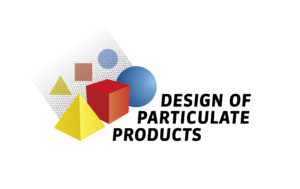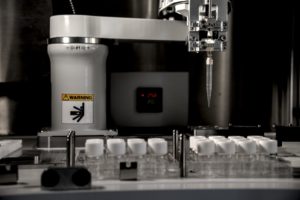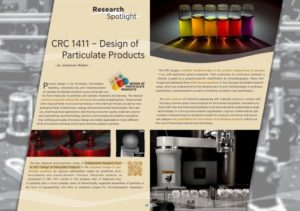CRC 1411 – Design of Particulate Products
Product design is the formation, formulation, handling, manufacturing and characterization of complex multiphase products across all length scales from molecules to particles and complex materials and devices. The desired product properties follow the demands of a variety of applications. These include both classical fields of process technology in the chemical industry as well as new emerging fields of electronics, energy and environmental technologies, life sciences, pharmaceutical applications, fast-moving consumer goods, materials science and engineering, nanotechnology, photonic technologies and additive manufacturing. Unifying principles of product design are widely applicable to many different kinds of products including solid, liquid and even gaseous particles.
 The key objective and long-term vision of Collaborative Research Centre 1411 “Design of Particulate Products” is the targeted design of particulate products by rigorous optimization based on predictive structure-property and process-structure functions. Particulate products, as considered in CRC 1411, consist in the simplest case of dispersed single particles and in more complex cases of hierarchically organized assemblies of particles in the form of supraparticles, thin films or stationary phases for chromatographic separation.
The key objective and long-term vision of Collaborative Research Centre 1411 “Design of Particulate Products” is the targeted design of particulate products by rigorous optimization based on predictive structure-property and process-structure functions. Particulate products, as considered in CRC 1411, consist in the simplest case of dispersed single particles and in more complex cases of hierarchically organized assemblies of particles in the form of supraparticles, thin films or stationary phases for chromatographic separation.
 The CRC targets scientific breakthroughs in the product engineering of nanoparticles with optimized optical properties. Their production by continuous synthesis is directly coupled to a property-specific classification by chromatography. These challenges are addressed from different perspectives in four strongly interlinked research areas, which are underpinned by the development of joint methodologies in synthesis, classification, characterization as well as modeling, simulation, and optimization.
The CRC targets scientific breakthroughs in the product engineering of nanoparticles with optimized optical properties. Their production by continuous synthesis is directly coupled to a property-specific classification by chromatography. These challenges are addressed from different perspectives in four strongly interlinked research areas, which are underpinned by the development of joint methodologies in synthesis, classification, characterization as well as modeling, simulation, and optimization.
 The joint venture of chemical engineering with materials science in concert with the basic sciences opens new prospects for all involved disciplines. Innovative products with new and improved properties must be produced by sustainable process technologies. In a strong move towards digitalization, rigorous mathematical optimization methods based on predictive models for products, structures and processes catalyze new possibilities for true design of multiphase products, which is at the core of mesoscale science and technology.
The joint venture of chemical engineering with materials science in concert with the basic sciences opens new prospects for all involved disciplines. Innovative products with new and improved properties must be produced by sustainable process technologies. In a strong move towards digitalization, rigorous mathematical optimization methods based on predictive models for products, structures and processes catalyze new possibilities for true design of multiphase products, which is at the core of mesoscale science and technology.

Text by Johannes Walter, images by Max Gmelch
